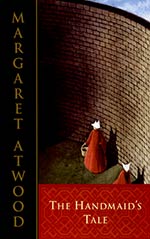
![]() Tar Daddoo
Tar Daddoo
12/29/2012
![]()
Reading through Wikipedia, I learned that Margaret Atwood was reluctant to have this book classified as Science Fiction She prefers the designation "Speculative Fiction". Although I do not normally make a strong distinction between these two terms, in this case, I think I agree with the author.
As Science Fiction, The Handmaid's Tale is rather disappointing. There is no scientific premise or belief that we must adopt or abandon to make sense of this story. It comes closest to being a form of Social Science Fiction in which some theory of social science plays out. Ultimately, this view is also disappointing, since the theory of interest is never identified and its rules never explored.
The novel is, however, a first class story of speculation, in which the author is less concerned with how the world came into being than with what it means to live in it. It is a nightmare world, filled with brooding and foreboding. Although it has been a while since I read 1984, I think this novel feels similar to me (though much easier to read.)
One aspect of the book that I found somewhat off-putting is that it does not have a strong plot. The interest in the story derives from slowly learning about the world: how it has come into being and how it operates. The actual tale is merely a glimpse into this world and not of great interest in its own right.
Having said all that, I did find the book well-written and interesting. The author's portrayal of a world in which women are so thoroughly subjugated is portrayed at a very personal level and at a societal level. While I had difficulty accepting that this world had come into being, I had no trouble understanding the world being portrayed. I felt trapped and without hope. I can see the seeds for that world in our world, but I don't want to go there.
Tar Daddoo